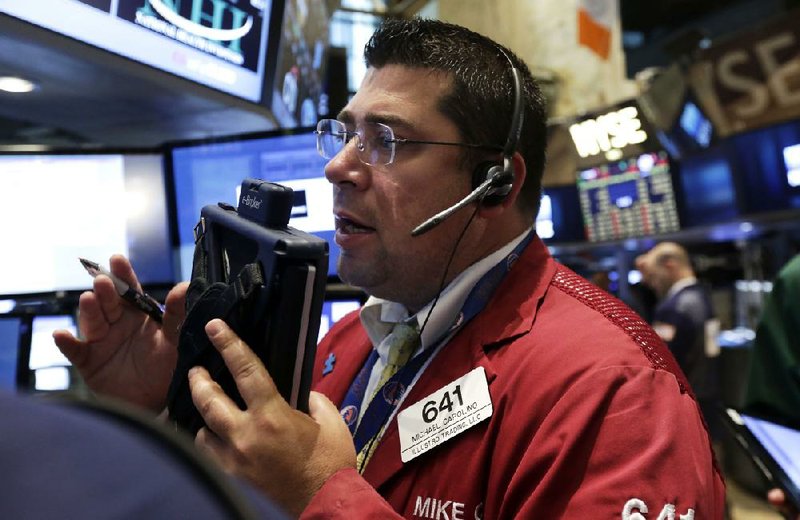NEW YORK -- Renewed concerns that tensions could flare up between Russian and Ukraine pushed U.S. stocks sharply lower Tuesday.
The Dow lost 139.81 points, or 0.8 percent, to 16,429.47, the lowest level for the index since mid-May. The Standard & Poor's 500 index lost 18.78 points, or 1 percent, to 1,920.21 and the Nasdaq composite fell 31.05 points, or 0.7 percent, to 4,352.84.
The market had been moderately lower all day, weighed down by a disappointing earnings forecast from retail giant Target and a report on China that showed the world's second-largest economy was slowing down.
The selling accelerated in afternoon trading. The Dow Jones industrial average fell nearly 200 points at one point, but recovered some of those losses in the last 30 minutes of trading.
Several traders pointed to news reports of a buildup in Russian troops on the Ukraine border and comments from a Polish politician who reportedly said Russia was poised to invade or pressure Ukraine's eastern border as catalysts for the selling.
"I would attribute the dip in S&P to the rumor that Russia's getting ready to invade Ukraine," said Walter Hellwig, a Birmingham, Ala.-based senior vice president at BB&T Wealth Management.
The developments came after the most recent round of sanctions were imposed on Russia by the U.S. and Europe last week. Russia called Tuesday for a meeting of the U.N. Security Council to discuss the situation in Ukraine.
"The market had been jittery," said Lou Shaduk, managing director of equity trading at Stifel Nicolaus & Co. in Baltimore. "You have Polish [Foreign] Minister [Radoslaw] Sikorski talking about Russian forces poised to pressure or invade Ukraine and that's all the buyers needed today to go into hiding."
The Ukraine-Russia tensions were "outweighing any good economic data" that investors had to work with Tuesday, said Tom di Galoma, a bond trader at ED&F Mann Capital.
The tensions between Russia and Ukraine have been a headache for investors for months now. However the stakes are higher than before, investors say.
With winter a few months away, Europe's recovering economy remains dependent on Russian natural gas for heat and electricity. Germany imports nearly all its natural gas from Russia, and France also gets a significant amount of its energy needs from Russia.
"Europe's economy is far more exposed to Russia than the U.S.," said Randy Frederick, a managing director at Charles Schwab.
Tuesday's losses add to what has been a tough couple of weeks for U.S. markets. The S&P 500 fell 2.7 percent last week, its worst five-day performance since June 2012. While the market did recover some Monday, Tuesday's losses wiped out those gains, leaving the Dow and S&P 500 lower for the week.
International events have been in the forefront of investors' minds for the past two weeks, and have been a major reason stocks have fallen. There was the near-failure of a Portuguese bank, Argentina defaulting on its bonds, the Israeli-Gaza conflict on top of the tensions between the U.S., Europe and Russia over Ukraine. Strategists say investors are in a wait-and-see mode.
"Once these geopolitical issues calm down, we should move higher from here," Frederick said.
One sign of investor nervousness can be seen in the VIX, a financial instrument that gauges how much stock market volatility investors expect in the future. The VIX jumped 10 percent to 16.71 on Tuesday. The index is trading at levels not seen since April and was as low as 11 just two weeks ago. The higher the index goes, the more turbulence investors expect to see in the future.
"There was a feeling among traders that [Monday's] rally didn't have sustainability," said Michael James, a Los Angeles-based managing director of equity trading at Wedbush Securities Inc. "People came in [Tuesday] unimpressed ... so we were sitting on wobbly legs even before this chatter around Ukraine came out."
Investors did get two positive reports on the U.S. economy, but it was not enough to move the market higher.
The Institute for Supply Management said the U.S. services sector expanded in July more than expected. The ISM survey came in at 58.7, more than the 56.5 economists had predicted. June factory orders also rose more than expected, rising 1.1 percent compared with the 0.6 percent increase economists were looking for.
The dollar rose to 102.56 yen and the euro dipped to $1.3377.
In energy markets, crude oil fell 91 cents to close at $97.38 a barrel on the New York Mercantile Exchange. Brent crude, a benchmark for international oils used by many U.S. refineries, fell 80 cents to close at $104.61 on the ICE Futures exchange in London.
Gold fell $3.70 to $1,284.00 an ounce and silver fell 40 cents to $19.83 an ounce. Copper fell four cents to $3.20 a pound.
The yield on the 10-year Treasury note was unchanged from the day before at 2.48 percent.
Information for this article was contributed by Ken Sweet of The Associated Press and Joseph Ciolli, Elena Popina and Lu Wang of Bloomberg News.
Business on 08/06/2014

